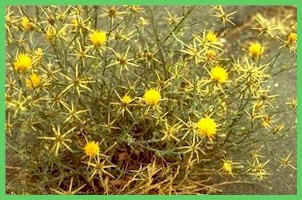We all know how miserable star thistle is; painful to walk through, dangerous for eyes, and potentially deadly to the horse if much of it is consumed. Ingestion of the weed over a period of time leads to neurological damage manifested as difficulty in swallowing. An afflicted horse is unable to eat or drink, and the condition is not reversible.
Mowing, burning, older herbicides and pulling by hand have all been used to manage star thistle, but with limited results. The seeds live for many years in the soil and even with regular efforts at control will continue to reinfest pastures. To have effective long-term control, the seeds in the soil must be depleted, and new seed production must be halted for at least three years.
Now, a recently licensed herbicide called Transline? gives us a very effective tool in battling this dangerous pest. Like any chemical herbicide it needs to be used as part of a well-planned, holistic strategy. Transline? has achieved a very high kill rate on star thistle in trials done by Dr. Joe DiTomaso at the University of California at Davis. He writes, “A limited number of herbicides are registered for use in California rangelands and pastures. Of these, the majority are applied to the foliage of target plants, including yellow star thistle. Most of these compounds, including 2,4-D, triclopyr (Garlon), dicamba(Banvel), and glyphosate (Roundup) have little or no soil activity, and thus will not control seedlings emerging after herbicide application. In contrast, the newly registered herbicide clopyralid (Transline?), has excellent soil (preemergence) and foliar (postemergence) activity.” Most legumes, such as clovers, will be killed by the Transline? but other grasses will not be. If desired, the clover can be re-seeded after the use of the Transline. It is not necessary to keep horses off the pasture after it is sprayed, but may be wise to keep them well-fed with hay for several days after spraying to minimize their intake of the sprayed foliage.
The best results have been obtained with application of Transline? between January and March, so that the new seedlings are killed and the product remains active against seeds that continue to sprout. It only needs to be applied once per year, and for three years for best control. The product is sold only in large containers, and is quite expensive per gallon. Only a small amount is used per acre. A “site number” must be granted by each county’s Agriculture Commissioner for record-keeping, and specialized equipment is necessary for application. For most horse owners hiring a contractor to do the work is the way to go. There is a minimum charge for application, but the cost per acre is quite reasonable.
The Agriculture Commissioner’s office for your county can give you a list of licensed pesticide control applicators. The UC Davis Cooperative Extension office in each county may also be able to help. Edson Enterprises is based in Sonoma County, and is available to apply Transline? in other counties as well. They will give a free estimate, and handle all of the necessary paperwork.
Stephanie Larson, UC Davis Cooperative Extension Range Management Specialist for Sonoma County, emphasizes the importance of good planning and follow-up in achieving good control. “Seeding with plants that compete w/ the star thistle, fertilizing, spot-spraying, and the use of biological controls will all help after the initial knockdown is achieved with the Transline?”. Her office is available for advice to people from all counties.
It is important to make plans early if you wish to use Transline. There are not many commercial applicators doing the work yet, and they will have a lot to do to get the Transline? applied during the optimum times.








